War Stories III (44 page)
Authors: Oliver L. North

ROBERT GREEN
taught at Fort Benning, Georgia, went to medical school on the GI Bill, and was commissioned in the Medical Corps. A practicing U.S. Army physician, he eventually served as a deputy in the surgeon general's office.
taught at Fort Benning, Georgia, went to medical school on the GI Bill, and was commissioned in the Medical Corps. A practicing U.S. Army physician, he eventually served as a deputy in the surgeon general's office.
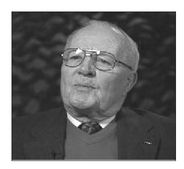
JEFFERSON WHITE
participated in three invasions, seven major battles, and earned the Silver Star for valor. He was wounded in action at the Battle of the Bulge and spent more than seven months recuperating in a Florida hospital.
participated in three invasions, seven major battles, and earned the Silver Star for valor. He was wounded in action at the Battle of the Bulge and spent more than seven months recuperating in a Florida hospital.

GEORGE PERRINE
was wounded three times during WWII. Treated in four U.S. military hospitals, his last wounds required hospitalization until 1947.
was wounded three times during WWII. Treated in four U.S. military hospitals, his last wounds required hospitalization until 1947.
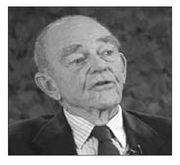
A. H. “ED” SPEAIRS
came back to Oklahoma City, wrote a book about his World War II experiences, and stayed in touch with his friend Bill Mauldin, whose famous Stars and Stripes cartoons helped GIs keep their sense of humor during WWII.
came back to Oklahoma City, wrote a book about his World War II experiences, and stayed in touch with his friend Bill Mauldin, whose famous Stars and Stripes cartoons helped GIs keep their sense of humor during WWII.
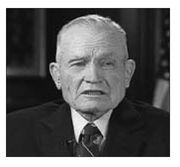
EDWIN “ED” SAYRE
recovered from his serious wounds, stayed in the Army, and retired as a colonel in 1968, after serving in Viet Nam. He described his most satisfying moment as the day he and a fellow officer convinced 3,000 Axis soldiers defending a small Italian town to surrenderâthereby precluding the need for an attack.
recovered from his serious wounds, stayed in the Army, and retired as a colonel in 1968, after serving in Viet Nam. He described his most satisfying moment as the day he and a fellow officer convinced 3,000 Axis soldiers defending a small Italian town to surrenderâthereby precluding the need for an attack.
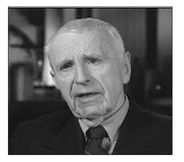
TIMOTHY “TIM” DYAS
, liberated from a German POW camp on 27 April 1945, made it across the Elbe River to American lines. He used the GI Bill to attend and graduate from Harvard.
, liberated from a German POW camp on 27 April 1945, made it across the Elbe River to American lines. He used the GI Bill to attend and graduate from Harvard.

EDWARD “ED” STAFFORD
, after serving in the European theater, was posted to the South Pacific to join the fight against the Japanese at Leyte Gulf and Okinawa. After the war he wrote a book based on his experiences in WWII.
, after serving in the European theater, was posted to the South Pacific to join the fight against the Japanese at Leyte Gulf and Okinawa. After the war he wrote a book based on his experiences in WWII.
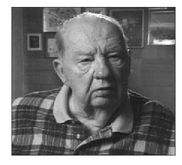
FELIX SPARKS
settled in Colorado after the war. During the 1961 Cuban Missile Crisis, he was recalled to active duty and eventually rose to the rank of brigadier general. He became a lawyer, judge, and state supreme court justice and in 1968 he was named ground commander for the Colorado National Guard.
settled in Colorado after the war. During the 1961 Cuban Missile Crisis, he was recalled to active duty and eventually rose to the rank of brigadier general. He became a lawyer, judge, and state supreme court justice and in 1968 he was named ground commander for the Colorado National Guard.

RAY SADOSKI
stayed in the Army until 1947 and played football at the Army War College. He married Eleanor (now deceased) in '46, and they had four children. Ray worked for Prudential Insurance and was a health inspector for the city of Hartford, CT.
stayed in the Army until 1947 and played football at the Army War College. He married Eleanor (now deceased) in '46, and they had four children. Ray worked for Prudential Insurance and was a health inspector for the city of Hartford, CT.
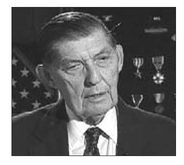
VAN T. BARFOOT
was awarded the Medal of Honor for single-handedly destroying two enemy machine-gun nests and capturing the crew of a thirdâtaking a total of seventeen enemy prisoners. He also disabled an enemy tank, killed its occupants, and carried two seriously wounded men of his platoon to safety through enemy fire.
was awarded the Medal of Honor for single-handedly destroying two enemy machine-gun nests and capturing the crew of a thirdâtaking a total of seventeen enemy prisoners. He also disabled an enemy tank, killed its occupants, and carried two seriously wounded men of his platoon to safety through enemy fire.

ROBERT “BOB” DOLE
was hospitalized for thirty-nine months recovering from the wounds he received in Italy. He earned a law degree on the GI Bill and entered politics in 1952. He subsequently served in the U.S. House of Representatives, in the U.S. Senate as majority leader, and in 1996 was the Republican nominee for president of the United States. In 1997 he was awarded the Presidential Medal of Freedom.
was hospitalized for thirty-nine months recovering from the wounds he received in Italy. He earned a law degree on the GI Bill and entered politics in 1952. He subsequently served in the U.S. House of Representatives, in the U.S. Senate as majority leader, and in 1996 was the Republican nominee for president of the United States. In 1997 he was awarded the Presidential Medal of Freedom.
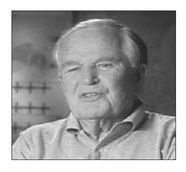
WALKER “BUD” MAHURIN
downed twenty-one enemy planes in Europe and one more in the Pacific theater. During the Korean War his F-86 was shot down over North Korea. Bud was a POW until the end of the Korean War.
downed twenty-one enemy planes in Europe and one more in the Pacific theater. During the Korean War his F-86 was shot down over North Korea. Bud was a POW until the end of the Korean War.
Other books
Footprints by Robert Rayner
Crown & Country: A History of England Through the Monarchy by Starkey, David
Aaron: Book Three (Scars 3) by West, Sinden
How to Be a Movie Star by William J. Mann
Ripley's Game by Patricia Highsmith
Savage Cinderella by PJ Sharon
The Veggie Spiral Slicer Cookbook by Kelsey Kinser
The Week of the Dead by Viktor Longfellow
Choices of the Heart by Daniels, Julia
The Underwriting by Michelle Miller